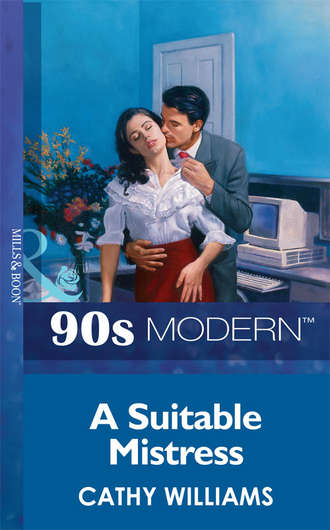
Полная версия
A Suitable Mistress

“Don’t you believe in marriage at all?” About the Author Title Page CHAPTER ONE CHAPTER TWO CHAPTER THREE CHAPTER FOUR CHAPTER FIVE CHAPTER SIX CHAPTER SEVEN CHAPTER EIGHT CHAPTER NINE CHAPTER TEN Copyright
“Don’t you believe in marriage at all?”
Suzanne continued, “You intend to give it a miss just because your father made a mistake?”
“I never said I intended to give marriage a miss,” Dane corrected her. “I merely don’t intend to rush into it because I happen to find a woman desirable.”
“And when do you propose to rush into it?”
“When someone suitable comes along.”
“Someone suitable,” Suzanne thought aloud. She knew what that meant. Someone elegant, good-looking, with the right background. Someone who stood at the opposite end of the spectrum to her!
CATHY WILLIAMS is Trinidadian and was brought up on the twin islands of Trinidad and Tobago. She was awarded a scholarship to study in Britain, and went to Exeter University in 1975 to continue her studies into the great loves of her life: languages and literature. It was there that Cathy met her husband, Richard. Since they married, Cathy has lived in England—originally in the Thames Valley but now in the Midlands. Cathy and Richard have three small daughters.
Cathy Williams writes lively, sexy romances
with heroes to die for! Look out for her
next book in our EXPECTING miniseries,
coming soon!
A Suitable Mistress
Cathy Williams

www.millsandboon.co.uk
CHAPTER ONE
ANOTHER bad day. Another bad week. Suzanne sat down on the edge of the bed and wondered when things were ever going to get better. She surely must have hit rock bottom now. Surely the law of averages said that things had to improve. No one could keep going downhill for ever.
At some point in time, one would crash-land somewhere at the bottom of the deep, dark well, and wouldn’t be able to go any further. Which, she thought tiredly, still left unanswered the question of how exactly you got out of the well, but presumably you would be so relieved not to be still falling that you wouldn’t give that too much hard thought.
Right now, though, she didn’t feel relieved. She felt trapped and hopeless, just as she had felt for the past six months.
She raised her head slightly and caught a glimpse of herself in the mirror opposite and looked away hurriedly.
She hated having to face what her head repeatedly told her. That she had let herself go. She hadn’t meant to; it seemed to be something that had happened when she hadn’t been looking, almost when she had had her back turned. She had put on weight, her long hair was neat enough but uninspiring and she knew that she appeared tired, even when she was forcing herself to put recent events behind her and show a smiling face to the world.
She reached inside her handbag, extracted a bar of chocolate, and, steeling herself not to think back, painstakingly removed the wrapper and bit into it, hardly tasting the sweetness, simply content that the sheer movement of eating helped to distract her from the tears which were lurking so close to the surface.
I’ve thrown in my accountancy course, she thought, rewrapping the uneaten bit of chocolate left with the same painstaking motions. I’ve come here to London in search of streets paved with gold, only to find that there’s no such thing, and to top it all I’ve now just lost my job. But there must be a bright side somewhere to this. She frowned and scoured her mind for the odd silver lining or two, and then told herself that she had hated that wretched job anyway.
She had just been a dogsbody, running around and doing all those untidy, boring chores which no one else wanted to do. The downside was that, however hateful it had been, it had at least been a source of income and now, without it, she gloomily contemplated a scenario of unpaid bills, bailiffs, screaming landladies and probably a park bench somewhere with only her pillow and a blanket for company.
It was, she admitted to herself, a fairly ludicrous scenario, since she would not allow herself to be without work, but she dwelled on it anyway, listlessly aware that she should really get out of the bedsit and do something instead of sitting like a block of lead on her bed and letting inertia get the better of her. A block, she thought with a flash of that irony which had recently deserted her, of overweight lead.
She stood up and walked across to the dreaded mirror and made herself look at the reflection staring out at her. There had been a time once, in a past which she couldn’t bear thinking about, when she had been attractive. Long, wavy dark hair, bright blue eyes, a slim, tall figure. Look at you now, she said to herself critically. Your hair desperately needs a trim, your eyes lack sparkle and you’re hardly going to win Miss Slender of the Year, are you?
She was still examining herself and telling herself that she really would go to the hairdressers, that she really would stop eating junk food which was doing absolutely nothing for her, when she heard someone knocking on the door. Very loud knocking. Knocking which instantly brought to mind screaming landladies. Or rather, just the one screaming landlady who seemed to have mastered the trick of avoiding complaints, while still vociferously demanding rent at least a week before it fell due.
You are not going to cower, she told herself sternly. You live in a bedsit which is in a fairly appalling condition, with a fridge that either freezes everything solid or else insists on defrosting at inconvenient times, and besides, you’re bigger than she is.
She strode purposefully towards the door, pulled it open, mentally steeled herself to say something about the fridge, not to mention the curtains which looked as though they were leftovers from the Stone Age, and stepped back in shock at the man standing outside the room.
She felt her face go scarlet and she knew that she was gaping, but for the life of her she couldn’t think of a thing to say.
Dane Sutherland was the very last person she had expected to see standing outside her door and she was conscious of a rush of awareness at the mere sight of him. Tall, dark and shamelessly good-looking, he was the last person she wanted to see.
‘What are you doing here?’ she asked the figure lounging indolently against the doorframe and making the dingy hallway look even dingier than it was.
‘I’ve had a hard time finding you.’
Still the same old voice that she remembered from years back. Deep, velvety, with a trace of dry mockery lurking there somewhere. He could charm the birds off the trees with that voice of his—a voice that held just enough lazy sensuality, a promise of things unspoken. She had watched from the sidelines just how many birds he had charmed off the trees as he had moved through adolescence into maturity. How utterly and childishly aware she had been of him.
It was difficult to know when exactly he had moved from the uncomplicated position of being her brother’s friend into the vastly more complicated one of being a deeply attractive person of the opposite sex.
She could remember when she was fourteen, looking at him surreptitiously from under her lashes, aware of him in a way that she had not been before: aware of him as a man, a first-year university graduate no less, already with the sort of cool, ironic self-assurance which gave him a maturity that her brother had lacked.
‘I suppose I had better ask you in,’ she said ungraciously, averting her eyes and walking back into the room, leaving him to shut the door. ‘I’m afraid I only have tea,’ she said, disliking his presence in her flat, disliking everything about him, and determined to be as churlish and unwelcoming as she felt she could reasonably get away with.
‘Tea would be fine.’ He followed her into the kitchen, which was barely big enough for one person and with him standing there felt chokingly claustrophobic.
She made them both mugs of tea, politely waited until he went back into the small sitting room, and then flopped into the chair furthest away from him.
‘I was very sorry to hear about your father’s death,’ he murmured, watching her intently with those grey, steely eyes, and she could feel the tears gathering momentum at the back of her throat. Again. Every time, in fact, she thought about her father.
‘I would have liked to have come to the funeral,’ he continued, looking at her over the rim of his cup, ‘but I was in New York at the time, and I just couldn’t make it.’
Suzanne shrugged. ‘I wouldn’t have expected you to put yourself out,’ she said coldly. ‘After all, he was just your family’s chauffeur, for heaven’s sake.’ Just the chauffeur who had worked for them nearly all his life; just the chauffeur who had lived in their cottage and pottered around in their garden; just the chauffeur who had collapsed and died in the line of duty.
‘Why on earth do you continue working for her?’ she had once asked her father.
‘Old Mr Sutherland would have wanted it,’ he had told her, which had made absolutely no sense to her at all. Old Mr Sutherland, she had wanted to point out, was dead, and had been for some time, and now his wife, or rather his second wife, was in charge, and she was an awful woman.
But she had not said anything because they had covered that ground before, and she had known what his answer would be: he was too old now to change, and besides, he liked the house, he liked the grounds, he liked the calm and peace of the countryside. So he had continued to work there, doing whatever the grand lady of the house wanted, which mostly had nothing to do with driving and much more to do with tending the lawns and taking the wretched poodles for walks and repairing whatever needed repair in the great mansion.
And all for what? Martha Sutherland hadn’t even attended the funeral. She had been busy getting ready for a cruise and had made unalterable plans. So a wreath had been sent in her place. A huge, gaudy one. And Dane, who had known him virtually since birth, had been busy as well. Because, after all, he was just their chauffeur, wasn’t he?
Her mind jumped back to that overheard conversation, and she closed the door on it.
She gave Dane a tinny, frozen smile and waited for him to ask her what she meant, but he ignored the pointed sarcasm behind her remark, although his eyes narrowed on her in a way that made her feel just a little bit ashamed that she had said what she had.
‘I thought you were working with that firm of accountants in the town,’ he said, and she shrugged and looked away.
‘I packed it in when Dad died.’ She had been so utterly miserable, and studying to qualify as an accountant—something of which her father had been so proud—had suddenly seemed trivial and meaningless. She had never been entirely sure that that was what she had wanted to do, and without her father’s encouragement she had been gripped by the thought that it was a career which had found her rather than the other way around. She had always been clever with figures and she had settled into accountancy the way that some people settle into marriage—because it was convenient.
‘Why?’
‘Because I wanted to leave the area. Is that a good enough explanation for you? Or would you like to pursue it further?’ She had had a plan, she thought defensively. Where had it gone? How could it have evaporated so quickly, like mist? How could she have ended up like a lost soul wandering in a fog, when she had started out with such determination?
‘And you think that he would have been happy to see you living like this?’ He looked around him at the scrappy room, with its sad, faded rug in front of the fireplace and skirting-boards which were in desperate need of a lick of paint. The bare essentials were so in need of repair that they sabotaged her every effort to make the bedsit into something warm and comfortable. The most she could achieve was neatness.
‘What have you come here for?’ she asked abruptly.
‘I wanted to offer my condolences personally to you, and I admit I was worried when they told me that you had walked out of the company.’
‘So you decided to fit me into your schedule. Big of you,’ she said acidly. Shame, she thought, that he had never been big enough to see that her father got a fair deal working for his stepmother. Shame that he hadn’t been big enough to listen to her father when he’d started getting tired for no reason. Shame that he hadn’t been big enough to let him retire in that cottage, instead of allowing his stepmother to imply that once the old man could no longer function he would have to move out and make way for someone who could.
The threat of having nowhere to live had been enough to keep her father on his toes, when in fact he should have been resting far more than he had been.
She swallowed down the great lump of resentment in her and stared down into the cup of lukewarm tea. The milk was gathering itself into a fine brown film. She inspected the film with minute concentration.
‘Shall I continue to ignore your acid little rejoinders, Suzie, or would you be happier if I gave in and indulged your desire to have a blazing row over nothing?’
‘Nothing!’ Her head shot up at that one and she looked at him with savage dislike. ‘How dare you sit here and say that? I’ve lost the only person in my life who has ever meant anything to me and you call that nothing? That stepmother of yours treated him like a workhorse and you call that nothing? He was old and frail and he should have had the dignity of being able to enjoy the rest of his days in that cottage of yours, without thinking that if he stopped lugging ladders and walking poodles he would no longer have a roof over his head.’
He stood up and walked across to the window and stared out, and although she couldn’t see the set of his face she could tell by the rigidity of his shoulders that he was angry.
‘I don’t like what you’re implying here,’ he said with disarming softness, turning round to face her. The light behind him threw his face into shadows and lent it an air of dark menace.
‘Then you’re free to leave.’ She nodded in the direction of the door and she was perversely pleased when he remained where he was, because, for the first time in the six months since her father had died, she was shouting, and glad to be shouting.
‘He loved your father,’ she threw at him. ‘Why do you think he continued working there, even when your father remarried three years ago? Why do you think he stayed there after your father died?’
‘I have been out of the country for nearly three years,’ Dane said in a controlled voice that didn’t quite manage to hide the undercurrent of anger and impatience at her accusations. ‘I had it on my stepmother’s word that everything at the house was fine.’
‘And that was the extent of your interest in the place?’ she asked bitterly. ‘And how thrilled your dad would have been with that!’
He moved more quickly than she could have expected. One minute he was standing there at the window, and the next minute he was leaning over her, his hands resting on either side of the chair.
‘Now you listen to me, my girl,’ he said tersely. ‘I haven’t come here to have an argument with you. Nor have I come here to be attacked for things I knew nothing of.’
‘In three years you never returned once to see for yourself how everything was, to check and make sure that people were happy!’
‘I had my reasons,’ he said grimly, still leaning over her, so that she began to feel something else mingling with her anger—something faint and disturbing which made her even more angry because she didn’t want to feel it.
She had been through that childish, excited infatuation with Dane Sutherland, and she had been disabused of it in no uncertain terms. She had no intention of letting dead embers re-ignite.
He might stand there and plead innocence to everything she said, but he must have known what was going on at Chadwick House. He must have known about the loyal help who had been sacked virtually the day after his father had died. He must have known of the promises made by his father to his workers, which had never been kept.
Old Mr Sutherland had promised her father the cottage. A gentleman’s agreement, because although her father had been his employee the two had been comrades—old friends who would sit and have a cup of tea and lament the passing of time with the shared memories of old men.
Dane must have known that his stepmother had put paid to any such agreement not five months after her husband had died. He must have known because Dane Sutherland was an intelligent man, frighteningly intelligent, and, after all, the house was his. She couldn’t believe, whatever he said, that he had cut himself off so completely from his past.
‘What the hell are you doing here, Suzie?’ he asked, straightening up and giving her time to compose her face and get her nervous system back in order again.
‘What do you mean?’
‘I mean,’ he said, sitting down on the sofa and crossing his legs, one ankle over his knee, ‘you’re a highly intelligent girl. You could have gone to university, but you chose to stay close to your father and apprentice in a company instead. You were doing damned well at it. So why did you throw it all in and move to London?’
‘You forget,’ she replied coolly, ‘that I no longer had a roof over my head. Your stepmother made it crystal-clear that she wanted the cottage back and the sooner I cleared out of it the better.’
‘Dammit, Suzie, you should have written to me in New York.’ He raked his fingers through his hair—a restless, impatient gesture that she could remember him making even as a teenager. Whenever he was angry over something. Her brother had tried to cultivate it, but somehow he had never managed to convey the same magnetic, effortless charm.
‘Thank you,’ she said politely, ‘but I haven’t resorted to asking for charity as yet. Besides, I couldn’t honestly imagine a worse hell than living in the vicinity of your stepmother.’
She thought of Martha Sutherland with distaste. Brassy blonde and, at thirty-two, less than half the age of the man she had married. She was the sort of woman whose nails were always impeccably varnished in red, and who never set foot out of the house without being sure that everything about her co-ordinated.
‘So you threw away your future and moved into a grimy bedsit in London instead.’
‘You don’t understand,’ she snapped.
‘I understand better than you think.’
‘After seeing me for the first time in years and after only forty-five minutes. What a genius you must be at reading other people’s characters.’
She hated this conversation and she wished that she could just take refuge in some of that uneaten chocolate lying in her bag. Then, for the first time since he had entered the room, she wondered what he must think, seeing her now. Seeing how much she had changed physically. She knew that he had never found her attractive; she just wasn’t his type—too tall, too gauche, too dark-haired—but what must he think of her now? Overweight, hair unflatteringly pulled back, dressed in dark colours which she knew did nothing for her—somehow she had lost the will to dress with any attempt at style.
She shoved aside the temptation to reach for her bag and extract the chocolate and contented herself with glaring at him.
‘What are you doing for money?’ he asked, looking at her with lazy speculation.
‘I have a job,’ she said sullenly. ‘I’ve been temping since I moved down here.’ She linked her fingers on her lap and frowned. Now that she had begun thinking about the changes he must see in her—all for the worse—she found that she couldn’t stop herself. She was acutely aware that her once flat stomach was not so flat as it had been, that her legs and thighs were filling out her trousers in a way that implied that if she continued snacking off bars of chocolate she would soon find herself moving up a size in clothes. Again.
‘Doing what, exactly?’
‘Doing whatever pays the rent. Exactly.’
‘But nothing to do with accountancy.’
‘I resent your criticisms,’ she told him resentfully. ‘You have no right to march in here and start telling me what I’m doing wrong with my life. Your zeal to do good would have been far more useful a year ago. In fact, it might have saved my father’s life.’
A heavy silence greeted this, but he was saved from having to say anything because someone knocked at the door and she leapt to her feet, carefully keeping her eyes firmly averted from his face.
It never paid to antagonise Dane Sutherland too much. He was a controlled person but when he was angry he could be immensely frightening. Once, when Dane was fifteen, the school bully had made the mistake, never again repeated, of making some sly, sneering remark about old Mr Sutherland. Dane hadn’t raised a finger. He hadn’t had to. He had just gone very close to him and said something which, hovering on the sidelines with two of her friends, she had not heard, but which had been enough to scare Tim Chapman into complete silence.
Thinking about it, she realised that he hadn’t bullied anyone again after that. In fact, when she’d last laid eyes on him he’d been a rather harassed father of four working at the garage outside town. Rumour had it that his wife took his money off him as soon as it landed in his hands and then doled it out to him as she saw fit.
She was almost relieved to see her landlady standing outside with her hands on her hips and a belligerent expression on her face. Almost, but not quite. The rent was, for once, late and money was, as always, thin on the ground.
‘I’ve been trying to get hold of you for the past four days,’ Mrs Gentry said, in that voice of hers which sent shivers of apprehension down her tenants’ spines, even when they had done nothing wrong.
‘I’m a bit behind this month with the rent, Mrs Gentry,’ Suzanne said, taking the bull by the horns.
‘You could say so.’ She pursed her lips and said in a reedy voice, ‘There’s many who would jump at the chance of renting this bedsit, I don’t have to tell you that. I warned you when I took you on that there was a lot of competition for this place; there’s many who would stand for days queuing up outside to rent here. It’s a prime area to be—’
‘Oh, really.’
Suzanne had never seen anyone make the landlady’s mouth fall open, but Dane did.
He stood next to her, with his hands in his pockets and a cold smile on his lips.
‘And I,’ he continued icily, ‘have yet to meet anyone prepared to stomach the downright primitive conditions of this dump, which you have the nerve to glorify by calling a bedsit.’ Mrs Gentry was staring at him, disconcerted and alarmed and shuffling from one foot to the other.
‘There’s many—’ she began, with an attempt to recapture some of her authority, and he cut her off swiftly.
‘Who are willing to put up with this ghastly hole simply because they have no choice. And there are some, of whom I am one, who would be more than willing to take you to court for renting out a place like this.’
‘Of course I would be more than prepared to fix a few things, more than prepared, if the miss here had complained—’
‘The fridge doesn’t work, Mrs Gentry,’ Suzanne interjected swiftly. ‘I mentioned that to you four months ago and I’ve been mentioning it every time I’ve seen you since.’
‘Of course,’ Mrs Gentry blustered, ‘I was about to say to you that I’ll have that fridge taken away and replaced. I’ve been meaning to do it for some time, sir—’ she reverted her attention to Dane, clearly at a disadvantage because he was so much taller than she was and she had to crane her neck upwards to look at him ‘—but I’ve been off my head with worry these last few months, what with the husband and his drinking problems.’









